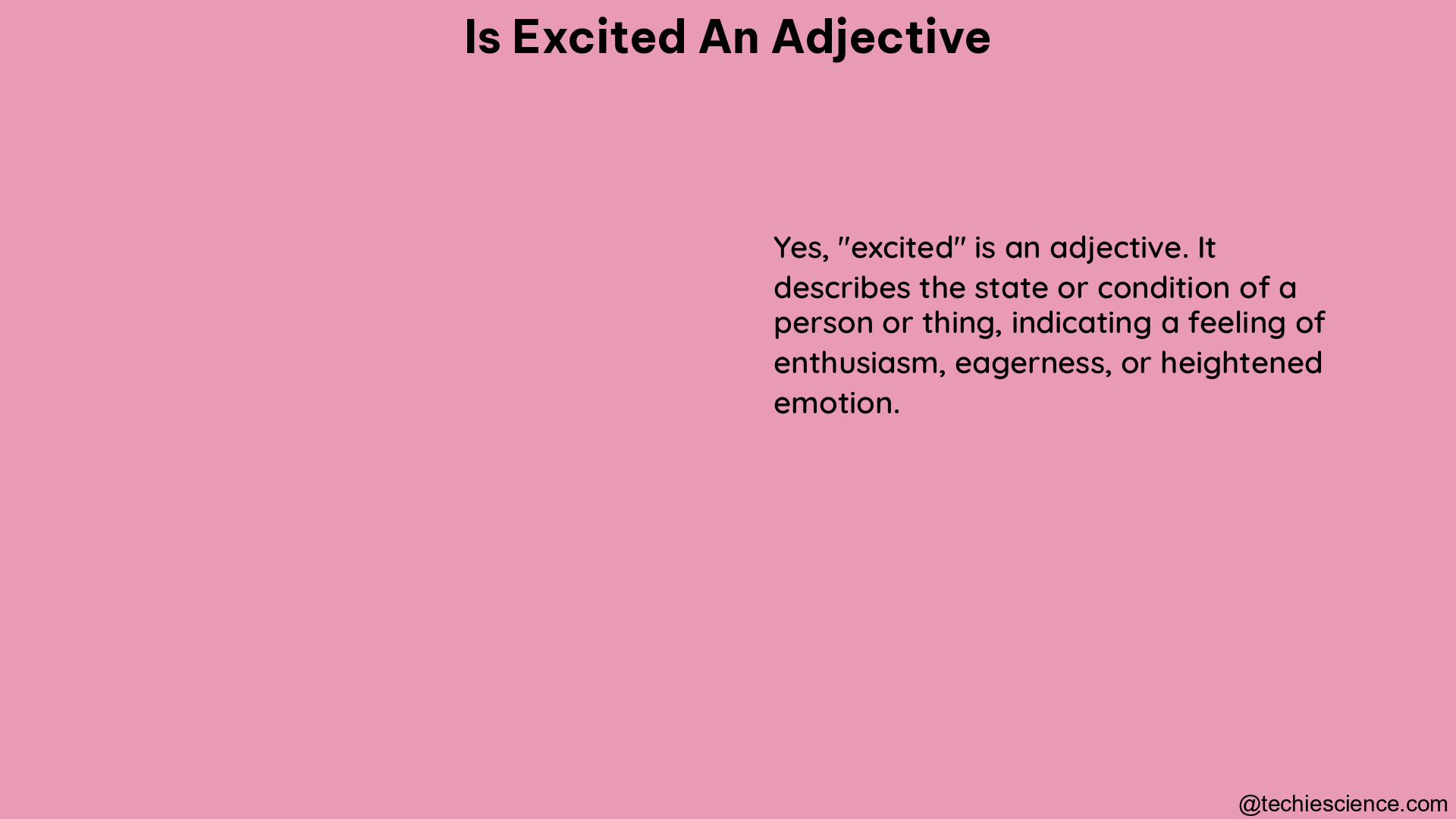Yes, “excited” is an adjective that is used to describe a state of heightened emotional arousal, typically characterized by feelings of happiness, enthusiasm, or eagerness. The adjective “excited” can be used in various contexts, including emotional state, physiological state, sexual arousal, and scientific contexts.
Emotional State
When used to describe an emotional state, the adjective “excited” is used to convey a sense of happiness, enthusiasm, or anticipation. This can be seen in examples such as:
- “The kids were excited about their vacation plans.”
- “I’m really excited about the opportunity to work with her.”
- “The children were too excited to sleep.”
In these examples, the adjective “excited” is used to describe the emotional state of the individuals, conveying their feelings of happiness, enthusiasm, or eagerness.
Physiological State

The adjective “excited” can also be used to describe a physiological state, where an individual or animal is in a state of nervous or upset arousal, often due to external stimuli. For example:
- “Some horses become excited when they’re in traffic.”
- “The loud noise from the construction site made the dog excited and unable to relax.”
In these cases, the adjective “excited” is used to describe the physiological state of the individual or animal, indicating a heightened state of arousal or nervousness.
Sexual Arousal
In some contexts, the adjective “excited” can be used to describe a state of sexual arousal. For example:
- “He was excited by the sight of her.”
- “The couple were both excited and eager to explore their new intimate relationship.”
In these examples, the adjective “excited” is used to convey a sense of sexual desire or arousal.
Scientific Context
In the scientific context, the term “excited” is used to describe a specific state of an atom or molecule. When an atom or molecule absorbs energy, it can transition to a higher energy level, known as an “excited state.” This excited state is then characterized by the adjective “excited.” For example:
- “The excited state of the atom emitted a photon.”
- “The molecule was in an excited state due to the absorption of energy from the laser.”
In these cases, the adjective “excited” is used to describe the specific state of the atom or molecule, indicating that it has gained energy and is in a higher energy level than its ground state.
History and Development
The adjective “excited” has a long history, with its earliest known use dating back to the mid-1600s. Over time, it has developed a range of meanings and uses, expanding beyond its initial emotional and physiological connotations to include scientific and technical applications.
The word “excited” is derived from the Latin word “excitare,” which means “to rouse or stir up.” This root meaning is reflected in the various ways the adjective is used to describe states of heightened arousal, whether emotional, physiological, or scientific.
Pronunciation
The pronunciation of the adjective “excited” can vary depending on the regional dialect or accent. In British English, the common pronunciations are:
- /ᵻkˈsʌɪtᵻd/ (uhk-SIGH-tuhd)
- /ɛkˈsʌɪtᵻd/ (ek-SIGH-tuhd)
In American English, the common pronunciations are:
- /ɪkˈsaɪdᵻd/ (ik-SIGH-duhd)
- /ɛkˈsaɪdᵻd/ (ek-SIGH-duhd)
These variations in pronunciation reflect the different ways the word is articulated in different English-speaking regions.
Conclusion
In summary, “excited” is an adjective that is used to describe a state of heightened emotional, physiological, or scientific arousal. It has a long history and has developed a range of meanings and uses over time, reflecting its versatility as a descriptive term. Whether used to convey feelings of enthusiasm, nervousness, sexual desire, or the state of an atom or molecule, the adjective “excited” is a powerful tool for conveying a sense of heightened energy and engagement.
References:
- https://www.oed.com/dictionary/excited_adj?tl=true
- https://www.oxfordlearnersdictionaries.com/us/definition/english/excited
- https://www.merriam-webster.com/dictionary/excited
- https://www.oxfordlearnersdictionaries.com/us/definition/american_english/excited
- https://www.dictionary.com/browse/excited

Hi…..I’m a graduate with a Bachelor’s degree in English Literature. I wish to do a Masters in the same field someday and continue my career in Academia.
Let’s connect through LinkedIn: